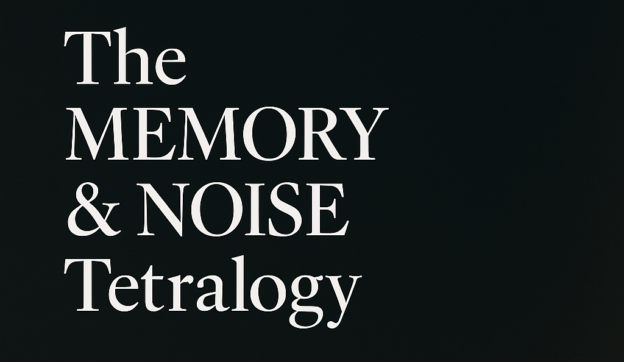What began as an exploration of two strange non-songs, “Apes Ma” and “Fitter Happier”, quickly unfolded into something larger: a meditation on memory, loss, defiance, and the strange work of sound in the spaces where meaning breaks down.
This tetralogy gathers three connected essays and the one you are reading now, not as conclusions, but as echoes. Not as closures, but as signals still carrying across time.
It began with a conversation with my son, Bill. We were talking about two short, unsettling songs, Captain Beefheart’s “Apes Ma” and Radiohead’s “Fitter Happier.” On the surface, they seem worlds apart. But the more we talked, the more I realised they share something fundamental. I saw in them a stark view of the human condition, its limits, its collapse, and its ultimate end. These aren’t just songs. They sit at the edge of things. They whisper through cracked speakers. They resist melody, structure, and resolution. They don’t explain, they persist.
But as I started writing, something deeper began to emerge. Anne Marie’s funeral is tomorrow, Monday the 7th of April, 2025. And it hit me that I wasn’t just talking about broken songs or anti-narratives. I was writing about loss. About echoes. About names, we still speak in silence. About memory, and the way it wraps itself in noise, in machines, in gestures that barely qualify as language.
And so, ergo sum, this became my “Memory & Noise Tetralogy”. Not just about songs. But about what remains.
A fun fact about Anne Marie: she saved my life. Not in a metaphorical “helped me out of a dark time” kind of way, but literally. Circa 1988. A man was beating me while I lay unconscious. My sternum was already shattered, four ribs broken, the bridge of my nose broken too. And Anne Marie, brave, fierce Anne Marie, dragged him off me. She didn’t stop until he was off. I regained consciousness with my head in her lap, bleeding in the street. Birmingham can be a tough old place. And without her, I have no doubt I’d be dead.
God bless you, Anne. And thank you not just for that but for all the years of loyalty, laughter, and love. This is for you. And for everyone who still echoes through the static in the lives of their loved ones.
Contents
- 1. Two Sides of the Same Coin: Captain Beefheart’s “Apes Ma” and Radiohead’s “Fitter Happier”
- 2. The Veil, the Soul Mirror, and Reflective Chrome Ghosts: On Memory, Music, and the Ones We Carry Onward
- 3. Do Not Go Quietly into That Dark Night: A Response to “Two Sides of the Same Coin”
- Nove Express: End of Trilogy, Beginning of Echo
1. Two Sides of the Same Coin: Captain Beefheart’s “Apes Ma” and Radiohead’s “Fitter Happier”
Some songs aren’t meant to be listened to once. Some you carry with you, not in melody, but in tone, like a scent that clings, or a glitch in a recording that never quite fades. In this opening piece, I explore two strange artefacts of modern music, Captain Beefheart’s “Apes Ma” and Radiohead’s “Fitter Happier”, as mirror reflections across generations.
Both resist form. They whisper instead of scream. They sit at the edges of albums, uninvited but unforgettable. This is about more than music. This is about what remains after language, self, and civilisation begin to crumble.
2. The Veil, the Soul Mirror, and Reflective Chrome Ghosts: On Memory, Music, and the Ones We Carry Onward
After examining the broken transmissions of “Apes Ma” and “Fitter Happier,” we move closer to what survives disintegration: memory. This is a reflection on loss, not as absence, but as continuation.
From Johnny Thunders’ lament that “you can’t put your arms around a memory” to Neil Young’s mournful cyber-ballad “Trans Am,” this piece explores the strange afterlife of those we carry. They live in us, not only in grief, but in gesture, voice, and love.
We are not simply keepers of stories. We are their continuation. The vehicle. The song still playing.
3. Do Not Go Quietly into That Dark Night: A Response to “Two Sides of the Same Coin”
This is a response to myself. To the first movement. To the question of what remains after words break and forms dissolve. The answer is not silence. It is not surrender. It is something else, something more defiant.
Echoing Rev. M. Gates’ “Oh Death, Where Art Thou Sting?” and Dylan Thomas’ timeless imperative to rage against the dying of the light, this piece stands not as elegy but as resistance. Quiet, yes. But unyielding. Even silence can be sacred defiance.
Nove Express: End of Trilogy, Beginning of Echo
Let us carry the noise and the silence both. Let us remember the ones who walked before us, not as absence, but as influence, as unfinished work, as names that refuse to fade. Let us not go gently. Let us speak, still, through the crackle and the hiss, as we decipher the signal-to-noise ratio of living on.
